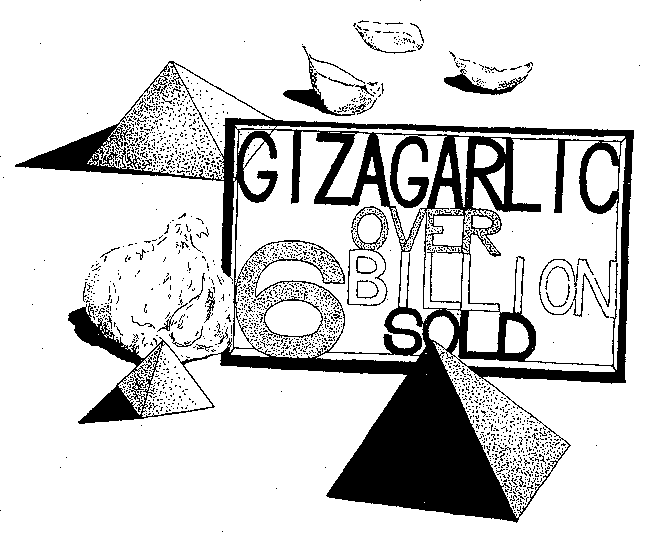
"O! He's as tedious as a tired horse, a railing wife; worse than a smoky house. I had rather live with cheese and garlic in a windmill, far, than feed on cates and have him talk to me in any summer-house in Christendom."
--William Shakespeare: Hotspur on Glendower in Henry IV, Part 1: III, 1
"To dream that you are eating garlic denotes that you will discover hidden secrets and meet with some domestic jar. To dream that there is garlic in the house is lucky."
--Richard Folkard in Plant Lore</> (1884)
"Garlicke hath properties that make a man winke, drinke and stinke."
--Thomas Nashe in The Unfortunate Traveller (1594)
"A nickel will get you on the subway, but garlic will get you a seat."
--old New York Yiddish saying
"There are many miracles in the world to be celebrated and, for me, garlic is the most deserving."
--Leo Buscaglia
"Wel loved he garlek, oynons, and eek lekes, And for to drynken strong wyn reed as blood."
--Chaucer, in The Canterbury Tales
"Garlic is as good as ten mothers."
--Telugu proverb
§ Home § Search § FoodTales § Any comments?
Garlic
(Allium sativum)
Alexander Dumas pere, in his Le Grand Dictionnaire de Cuisine remarked that:
"Everybody knows the odor garlic except the one who has eaten it and wonders why everybody turns away from him."
- Athenaeus says that no one who had eaten garlic could enter the sacred temple of Cybele.
- Virgil refers to it as useful to restore the strength of reapers against the heat, and the poet Macer says that it was used to prevent people--threatened by the possible attack of snakes--from falling asleep.
- The Egyptians worshiped it.
- The Greeks detested it.
- The Roman people ate it with delight.
- Horace, who suffered indigestion on the very day of his arrival at Rome from a sheep's head prepared with garlic, had a horror of it.
- Shakespeare had Bottom exhort his fellow thespians, "And, most dear actors, eat no onions nor garlick, for we are to utter sweet breath" (Midsummer Night's Dream, IV, 2).

It was fed by Egyptian slave masters to laborers who built the Great Pyramid of Giza about 3000 BC: an inscription on the pyramid states the exact cost of the garlic, radishes, and onions consumed during its construction. Indeed, we read in Numbers 11:5 how the children of Israel missed it when they left Egypt. Crying in the wilderness, they lamented,
Avoided by the Roman nobility, it was included in the rations of Roman soldiers to make them strong and heroic."We remember the fish, which we did in Egypt freely; the cucumbers, and the melons, and the leeks and the onions, and the garlick."
Galen (2nd century AD) used it as an antidote to poisons.
Pliny the Elder said it was good for toothache, ulcer, and asthma--not to mention stimulating sexual and gustatory appetite.
Mohammed, prophet of Islam, extolled its use for scorpion and snake bites.
In European folklore, it is believed to be a protection against the "evil eye" and to make witches and vampires disappear at its very sight.
During the Dark Ages, people believed it could ward off the plague and wore garlands of it as protection. In fact, as recently as 1917 and 1918, Americans wore garlic garlands in public during influenza epidemics--and Eleanor Roosevelt was said to take 3 chocolate-covered garlic pills each morning, on the advice of her doctor, to improve her memory.
Lest we laugh too hard at these superstitions, we should note that modern medicine recognizes its very real antibacterial qualities, which stem from its high supply of organic sulfur compounds. And many doctors recognize its ability to break down fibrin, possibly reducing the effects of heart and blood diseases.
Most people agree it began life in Central Asia--and spread rapidly, even to the Americas, in ancient times. But it's Gilroy, California, that has enshrined it in true American capitalist style. This so-called "Garlic Capital of the United States" (the French Garlic Capital is in Arleux, north of Paris, in the fields of the first World War), produces over 200 million pounds of garlic a year--and makes some pretty bizarre dishes with all that bounty.
So what about ways to reduce that BAD garlic breath? Some say that it's as easy as chewing a sprig of parsley. Don't take that to the bank. Chlorophyll has some effect, but not enough.